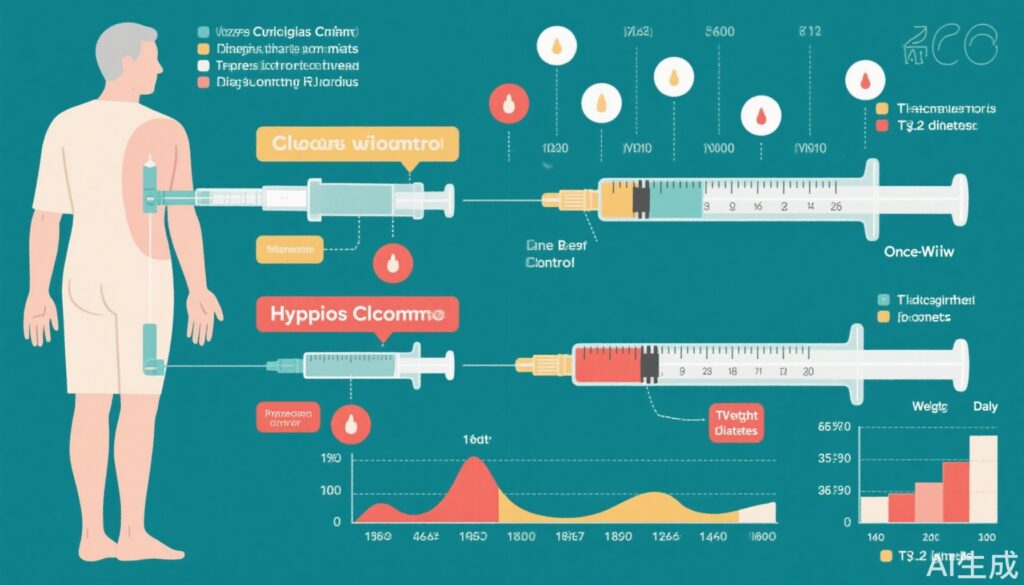Highlights
- Once-weekly insulin therapies (IcoSema, efsitora alfa) offer non-inferior glycemic control to daily basal or basal-bolus regimens in adults with type 2 diabetes.
- IcoSema demonstrates advantages in body weight reduction, lower total insulin dose, and significantly reduced hypoglycemia risk compared to basal-bolus therapy.
- Efsitora alfa is as effective and safe as daily basal insulins (glargine U100, degludec) and is well tolerated in both basal-only and basal-plus-prandial regimens.
- Once-weekly administration offers substantial reductions in injection burden, potentially improving adherence and quality of life.
Clinical Background and Disease Burden
Type 2 diabetes mellitus (T2DM) is a progressive and highly prevalent metabolic disorder, affecting hundreds of millions globally. Despite advances in oral agents and non-insulin injectables, many patients eventually require insulin therapy to achieve and maintain glycemic targets. However, clinical inertia, fear of hypoglycemia, and the burden of daily injections limit optimal, timely intensification. Basal-bolus regimens, while effective, are associated with increased risk of hypoglycemia, weight gain, and significant treatment complexity. Once-weekly insulin formulations aim to address these barriers, offering the potential for simplified regimens, improved adherence, and better patient outcomes.
Research Methodology: Study Designs and Populations
The three pivotal trials—COMBINE 3, QWINT-3, and QWINT-4—were large, open-label, phase 3 randomized controlled trials, each employing a treat-to-target, non-inferiority design.
- COMBINE 3 enrolled 679 adults with T2DM inadequately controlled on daily basal insulin, randomizing them to once-weekly IcoSema (a fixed-ratio combination of insulin icodec and semaglutide) or standard basal-bolus therapy (BBT: daily glargine U100 plus two to four daily aspart injections) over 52 weeks.
- QWINT-4 (n=730) compared once-weekly efsitora alfa (a novel basal insulin) to daily glargine U100, both with prandial insulin lispro, in adults with T2DM on basal-plus-prandial regimens over 26 weeks.
- QWINT-3 (n=986) evaluated once-weekly efsitora alfa versus daily degludec in adults with T2DM controlled on basal insulin (with or without up to three non-insulin agents, but no prandial insulin) over 78 weeks.
All studies included adults with suboptimally controlled T2DM (baseline HbA1c 6.5–10%) and reflected typical clinical populations in terms of age, BMI, and comorbidities. Primary endpoints were change in HbA1c from baseline to trial completion, with prespecified non-inferiority margins (0.3–0.4%). Secondary endpoints included hypoglycemia rates, body weight, insulin dose, and adverse events.
Key Findings: Comparative Efficacy and Safety
Glycemic Control
All three trials confirmed non-inferiority of once-weekly regimens to daily comparators for HbA1c reduction:
- IcoSema vs BBT (COMBINE 3): HbA1c change at 52 weeks: -1.47% (IcoSema) vs -1.40% (BBT); estimated treatment difference (ETD) -0.06% (95% CI -0.22 to 0.09).
- Efsitora vs Glargine U100 (QWINT-4): HbA1c change at 26 weeks: -1.01% (efsitora) vs -1.00% (glargine U100); ETD within non-inferiority margin.
- Efsitora vs Degludec (QWINT-3): HbA1c change at 26 weeks: -0.81% (efsitora) vs -0.72% (degludec); ETD -0.09% (95% CI -0.19 to 0.01).
Hypoglycemia
Once-weekly IcoSema showed a marked reduction in clinically significant and severe hypoglycemia versus BBT (0.21 vs 2.23 events per person-year; rate ratio 0.12 [0.08-0.17], p<0.0001). For efsitora, hypoglycemia rates were similar to daily comparators in both QWINT-3 and QWINT-4, with no statistical difference in combined level 2 or 3 hypoglycemia.
Body Weight and Insulin Dose
IcoSema led to substantial weight reduction (ETD -6.72 kg vs BBT, p<0.0001) and a lower weekly insulin dose (-270 U vs BBT). Efsitora trials did not show significant weight differences, consistent with expectations for basal insulin without GLP-1 agonist effects.
Adverse Events and Tolerability
Gastrointestinal side effects were more frequent with IcoSema, likely attributable to semaglutide. Infection rates were higher with BBT. Efsitora demonstrated similar rates of adverse and serious adverse events to daily basal insulins, with no new safety signals. Cardiovascular events and deaths were rare and unrelated to study drug.
Mechanistic Insights
IcoSema combines the glucose-lowering effects of basal insulin icodec and GLP-1 receptor agonist semaglutide, enhancing both fasting and postprandial glycemic control, reducing insulin dose requirements, and promoting weight loss. Efsitora alfa, a once-weekly basal insulin, is designed for prolonged, stable absorption, minimizing glycemic variability and enabling simplified dosing without compromising efficacy or safety.
Expert Commentary
International diabetes guidelines (ADA/EASD 2024) increasingly recognize the importance of individualized therapy and reducing treatment burden. The results of these trials align with the paradigm shift toward patient-centric regimens, where simplification and quality of life are prioritized alongside glycemic metrics. Dr. Billings et al. (2025) emphasize the transformative potential of once-weekly therapies for patients struggling with daily injection fatigue or adherence.
Limitations and Controversies
Open-label designs may introduce performance or reporting bias, although objective endpoints (HbA1c, hypoglycemia) are less susceptible. The trials excluded certain populations (e.g., type 1 diabetes, severe renal/hepatic impairment), limiting generalizability. Real-world long-term effectiveness, cost, and access remain to be fully evaluated. Gastrointestinal tolerability with IcoSema may be a consideration, and the impact of once-weekly regimens on rare but serious insulin-related complications requires further surveillance.
Conclusion
Once-weekly insulin regimens—either as insulin-only (efsitora alfa) or in fixed combination with GLP-1RA (IcoSema)—represent a major step forward in T2DM management. They provide equivalent glycemic control to daily basal or basal-bolus regimens, with reduced hypoglycemia risk (notably with IcoSema), weight benefits (for IcoSema), and substantially less injection burden. These innovations may improve adherence, patient satisfaction, and ultimately clinical outcomes, especially in those struggling with daily injections or requiring complex intensification. Future research should address long-term outcomes, cost-effectiveness, and integration into real-world practice.
References
- Billings LK, Andreozzi F, Frederiksen M, et al. Once-weekly IcoSema versus multiple daily insulin injections in type 2 diabetes management (COMBINE 3): an open-label, multicentre, treat-to-target, non-inferiority, randomised, phase 3a trial. Lancet Diabetes Endocrinol. 2025;13(7):556-567.
- Blevins T, Dahl D, Pérez Manghi FC, et al. Once-weekly insulin efsitora alfa versus once-daily insulin glargine U100 in adults with type 2 diabetes treated with basal and prandial insulin (QWINT-4): a phase 3, randomised, non-inferiority trial. Lancet. 2025;405(10497):2290-2301.
- Philis-Tsimikas A, Bergenstal RM, Bailey TS, et al. Once-weekly insulin efsitora alfa versus once-daily insulin degludec in adults with type 2 diabetes currently treated with basal insulin (QWINT-3): a phase 3, randomised, non-inferiority trial. Lancet. 2025;405(10497):2279-2289.
- American Diabetes Association. Standards of Medical Care in Diabetes—2024. Diabetes Care. 2024;47(Suppl 1):S1-S350.


